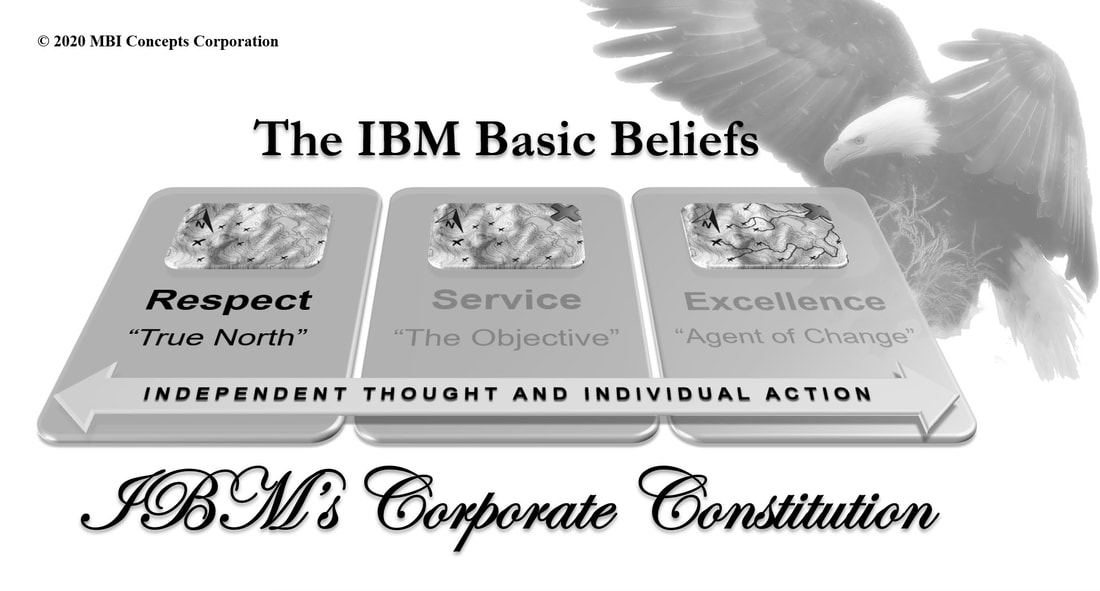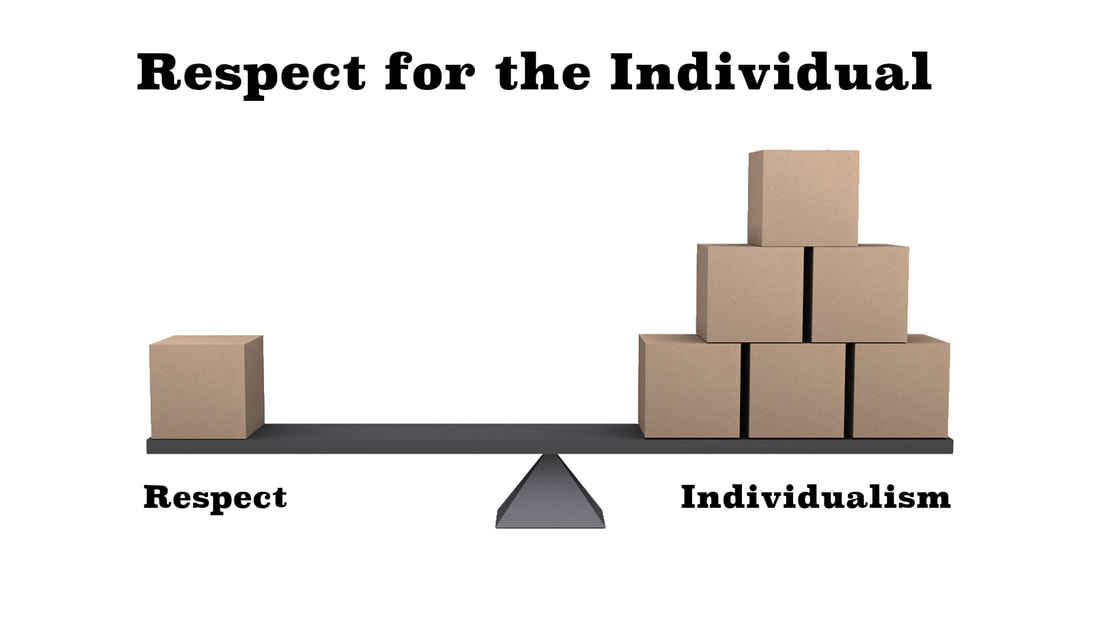Our basic belief is respect for the individual, for his rights and dignity.
IBM's Basic Belief: Respect for the Individual
|
|
Date Published: August 4, 2021
Date Modified: February 17. 2024 |
In today’s social media environment it seems appropriate that this article about “Respect for the Individual” should begin with the definition of respect: Respect /rə’spekt/ noun: A feeling of deep admiration for someone elicited by their abilities, qualities, or achievements, while giving due regard for the feelings, wishes, rights, or traditions of others.
Respect for the Individual Was IBM's "North Star"
Our basic belief is respect for the individual, for his rights and dignity. It follows from this principle that IBM should:
- Help each employee to develop his potential and make the best use of his abilities.
- Pay and promote on merit.
- Maintain two-way communications between manager and employee, with opportunity for a fair hearing and equitable settlement of disagreements.
Respect: IBM's North Star
Some individuals believe that “respectful disagreement” is an oxymoron like: “jumbo shrimp,” “open secret,” “half dead,” or, as we used to joke in the ’70s of the U.S. Army, “military justice.” Individuals, who see “respectful disagreement” in this manner, are “clearly confused.”
Respectful disagreement doesn’t mean that individuals won’t go toe to toe with each other—aggressively standing up for what they believe. It means they present their ideas as organized and well-though-out reasonings, and they avoid hitting below the belt. Respectful disagreement doesn’t mean that individuals need to be one of Buck Roger’s loyal dissenters and remain still: it means each individual has to find their way of standing their ground until they are heard: respectfully.
Respect, calms nerves in a room full of tension. Respect soothes objections but doesn’t suppress them. Respect extracts and encourages thoughtful engagement. This is why Respect for the Individual was the foundational belief. It tilled the soil of human nature so it could accept the corporation’s high-nitrogen, growth fertilizer: THINK!
Respect amplifies admiration, increases due regard for another’s feelings and traditions, and encourages engaged thoughtful discussion on even the hardest and most divisive of topics. There is little long-term hope for a corporation that doesn’t ensure every employee can have respectful conversations with their immediate manager on difficult topics like pay, promotion, individual reward for individual effort, and performance.
Respect is how a community of individuals maintain their bearing while constantly adjusting the means to attain a common goal.
Respect was IBM’s 20th Century North Star.
Respect, calms nerves in a room full of tension. Respect soothes objections but doesn’t suppress them. Respect extracts and encourages thoughtful engagement. This is why Respect for the Individual was the foundational belief. It tilled the soil of human nature so it could accept the corporation’s high-nitrogen, growth fertilizer: THINK!
Respect amplifies admiration, increases due regard for another’s feelings and traditions, and encourages engaged thoughtful discussion on even the hardest and most divisive of topics. There is little long-term hope for a corporation that doesn’t ensure every employee can have respectful conversations with their immediate manager on difficult topics like pay, promotion, individual reward for individual effort, and performance.
Respect is how a community of individuals maintain their bearing while constantly adjusting the means to attain a common goal.
Respect was IBM’s 20th Century North Star.
Respect: IBM’s Common, Unifying Denominator
|
The North Star holds still while the heavens of the northern sky move around it. It serves as a guide
|
It may be an overstatement to say that 100% of IBM employees knew about “respect for the individual.” There are always some individuals in any organization that are clueless, but it would be an understatement to say that ninety-nine out of one hundred long-time employees used this fundamental belief sometime during their IBM careers — especially when making an important business or personnel decision.
Respect was the source of right over might. It empowered the individual to seek advice from or to challenge decisions at every level of his or her chain of command — all the way to the corner office if necessary. |
But before a conscientious individual went to such extremes, they oriented themselves with this belief, because it was the corporation’s immovable reference point.
Respect transcended color, creed, sex, national origin, and sexual orientation. Respect, though, was also about more than externals. It accepted each person’s inherent internal uniqueness in order to maintain harmony between all the individuals who made up the corporation. It meant accepting the different backgrounds, viewpoints, temperaments, and abilities of thousands of unique personalities.
Because of this, respect made it easier to acknowledge one’s personal strengths and weaknesses, and made it appropriate to discuss someone else’s gifts and shortcomings. Respect demanded a discussion of a poor performance to transform it into a good performance. It was also expected that anyone failing to live up to this standard would be fired: respect was sacrosanct, and it was an enforced condition of employment.
While some believe it is impossible to achieve respect between all individuals, IBMers constantly strived to attain it. This belief of Watson Jr.’s captured in one word the attitude that Watson Sr. expressed when he said, “We are just men—men standing together, shoulder to shoulder, all working for one common good; we have one common interest, and the good of each of us as individuals affects the greater good of the company.”
It may seem counterintuitive, but respect for the individual was designed to serve the greater good.
Respect transcended color, creed, sex, national origin, and sexual orientation. Respect, though, was also about more than externals. It accepted each person’s inherent internal uniqueness in order to maintain harmony between all the individuals who made up the corporation. It meant accepting the different backgrounds, viewpoints, temperaments, and abilities of thousands of unique personalities.
Because of this, respect made it easier to acknowledge one’s personal strengths and weaknesses, and made it appropriate to discuss someone else’s gifts and shortcomings. Respect demanded a discussion of a poor performance to transform it into a good performance. It was also expected that anyone failing to live up to this standard would be fired: respect was sacrosanct, and it was an enforced condition of employment.
While some believe it is impossible to achieve respect between all individuals, IBMers constantly strived to attain it. This belief of Watson Jr.’s captured in one word the attitude that Watson Sr. expressed when he said, “We are just men—men standing together, shoulder to shoulder, all working for one common good; we have one common interest, and the good of each of us as individuals affects the greater good of the company.”
It may seem counterintuitive, but respect for the individual was designed to serve the greater good.
Respect and Individualism: A Supreme Balancing Act
|
It is important, though, to understand how respect can fly off the rails, and it is found in the counterbalancing word in this basic belief: individual. One of the problems with “individualism” is that in its extreme it may challenge respect.
To put a name to this problem, many early American leaders added an adjective before the word: Theodore Roosevelt used several: “absolute,” “unlimited,” “unrestrained,” and “unrestricted” individualism; Otto H. Kahn called it “unfettered” individualism. William H. Baldwin called it “unchecked” individualism. Ida M. Tarbell called it “excessive” individualism. |
Finding the balance between respect and individualism is not always easy
|
Every corporation has to be on the guard for extreme individualism without threatening the spirit of the individual. To put it mildly, it is a difficult balancing act. So, remain individualistic but be forever on the guard for its extreme. Respect is how a social community of individuals keeps its bearings while integrating “uniqueness” or “individuality” into a common push toward an agreed to goal.
Sometimes respect means taking the edge off one’s own individuality.
Sometimes respect means taking the edge off one’s own individuality.
Roam Around the IBM Wild Duck Information with the Links Below
or [Return to the Wild Ducks Home Page]
or [Return to the Wild Ducks Home Page]



